June
2019
June 5, 2019
NASAA News and Current Information
Watch Speaker Videos from NASAA’s Capitol Hill Briefing on Arts and Rural Prosperity
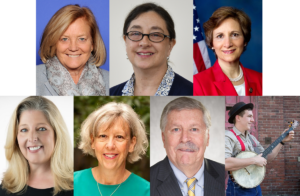
Arts and Rural Prosperity Briefing speakers (top row, from left) Rep. Chellie Pingree (D-ME), Karen McCarthy from the office of Sen. Lisa Murkowski (R-AK), Rep. Suzanne Bonamici (D-OR); (bottom row, from left) National Endowment for the Arts Acting Chairman Mary Anne Carter, Bozeman, Montana Mayor Cyndy Andrus, Rural Policy Research Institute President Emeritus Charles Fluharty, and educator and musician Tyler Hughes of Big Stone Gap, Virginia
NASAA’s Arts and Rural Prosperity briefing on Capitol Hill last month attracted not only legislators and their staff, but arts advocates and artists from around the country via our live webcast on Facebook. We’ve excerpted the speakers’ presentations into short videos. Viewers in the room and on-line heard these experts from the public and private sectors share the latest research and real-life examples of how arts and culture boost employment and improve quality of life in America’s rural communities.
It’s Never Too Late
A HUGE thank you to everyone who contributed to NASAA’s Spring Giving Campaign! With your support, NASAA will keep fighting for and promoting public investment in the arts. It’s a big job, but your help makes it possible. If you haven’t given to NASAA yet and want to join in our work, you can! Please donate now to strengthen state arts agencies and help us meet the year-round demands of our advocacy work. Thank you!
Three Cheers for 2019 Poetry Out Loud Winners!
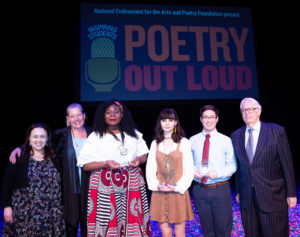
Left to right: NASAA President and CEO Pam Breaux, National Endowment for the Arts Acting Chairman Mary Anne Carter, second-place finalist Scottlynn Ernestine Ballard from Illinois, 2019 Poetry Out Loud National Champion Isabella Callery from Minnesota, third-place finalist Alejandro J. Campo from Georgia, and Poetry Foundation President Henry Bienen. Photo by James Kegley
NASAA congratulates the winners of the national Poetry Out Loud competition, held in May. Minnesota high school senior Isabella Callery is the 2019 Poetry Out Loud National Champion. She garnered a $20,000 award for taking the top prize among the more than 275,000 student-competitors nationwide who participated in the program this year. Second and third place went to Illinois’s Scottlynn Ernestine Ballard and Georgia’s Alejandro J. Campo, respectively. This is the 14th year that the National Endowment for the Arts and the Poetry Foundation have partnered with state arts agencies to support Poetry Out Loud, a contest that encourages the nation’s youth to learn about great poetry—both classic and contemporary—through memorization and recitation. The program helps students master public speaking skills, build self-confidence and learn about their literary heritage.
Artists and Other Cultural Workers: A Statistical Portrait
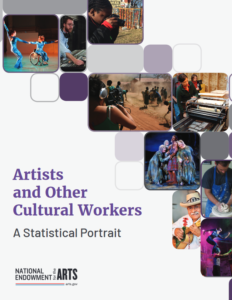 Artists and Other Cultural Workers: A Statistical Portrait is a new report from the National Endowment for the Arts describing the labor force of artists and cultural workers. The report analyzes six federal data sets—primarily from the U.S. Census Bureau and the Bureau of Labor Statistics—to create a profile of 11 artist occupations and cultural occupations, such as librarians, editors, curators, theatrical makeup artists and sound engineering technicians. It covers employment and income trends, work-force demographics, and employment projections for creative occupations, among other things. The report extends the range of statistics that the arts endowment has tracked in the past.
Artists and Other Cultural Workers: A Statistical Portrait is a new report from the National Endowment for the Arts describing the labor force of artists and cultural workers. The report analyzes six federal data sets—primarily from the U.S. Census Bureau and the Bureau of Labor Statistics—to create a profile of 11 artist occupations and cultural occupations, such as librarians, editors, curators, theatrical makeup artists and sound engineering technicians. It covers employment and income trends, work-force demographics, and employment projections for creative occupations, among other things. The report extends the range of statistics that the arts endowment has tracked in the past.
Brain Drain across the U.S. Since 1940
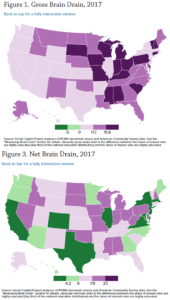 The U.S. Congress Joint Economic Committee, one of four standing committees comprising members of the Senate and House, has published a new report analyzing “brain drain” in all 50 states between 1940 and 2017. The report, Losing Our Minds: Brain Drain across the United States, defines “brain drain” as highly educated residents between the ages of 31 and 40 moving away from their birth state to another state. Through a dynamic infographic and a number of maps, tables and charts, the resource considers how much gross and net brain drain each state has experienced over nearly eight decades. The report is based on decennial U.S. Census data as well as the 2010 and 2017 American Community Surveys.
The U.S. Congress Joint Economic Committee, one of four standing committees comprising members of the Senate and House, has published a new report analyzing “brain drain” in all 50 states between 1940 and 2017. The report, Losing Our Minds: Brain Drain across the United States, defines “brain drain” as highly educated residents between the ages of 31 and 40 moving away from their birth state to another state. Through a dynamic infographic and a number of maps, tables and charts, the resource considers how much gross and net brain drain each state has experienced over nearly eight decades. The report is based on decennial U.S. Census data as well as the 2010 and 2017 American Community Surveys.
Elizabeth Shapiro Is Director of Arts, Preservation and State Museums in Connecticut
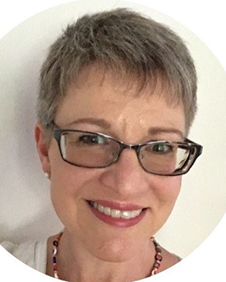 Elizabeth Shapiro was named director of arts, preservation and state museums at the Connecticut Office of the Arts in May. She had been serving as interim director of culture and director of operations for museums and historic preservation for the state. Shapiro has more than 30 years of experience in museums of all sizes, shapes and areas of concentration. A graduate of Haverford College (B.A.) and the Cooperstown Graduate Program in History Museum Studies (M.A.), she has worked as curator of the galleries at Babson College, director of the Sharon (CT) Historical Society and executive director of the Connecticut League of History Organizations. In addition to oversight of the full panoply of programs offered by the Connecticut Office of the Arts and the State Historic Preservation Office, she is privileged to develop new strategic directions for the Prudence Crandall Museum, Old New-Gate Prison & Copper Mine, the Eric Sloane Museum and the Henry Whitfield State Museum. Shapiro has served as a private consultant and a Peer Advisor for the state, working with institutions as diverse as the Torrington Symphony Orchestra, the New Canaan Preservation Alliance and the Northwest Arts Council. She is the editor of several books, including Echoes of Iron in Connecticut’s Northwest Corner and Seldom Told Tales of Sharon, volumes 1-3.
Elizabeth Shapiro was named director of arts, preservation and state museums at the Connecticut Office of the Arts in May. She had been serving as interim director of culture and director of operations for museums and historic preservation for the state. Shapiro has more than 30 years of experience in museums of all sizes, shapes and areas of concentration. A graduate of Haverford College (B.A.) and the Cooperstown Graduate Program in History Museum Studies (M.A.), she has worked as curator of the galleries at Babson College, director of the Sharon (CT) Historical Society and executive director of the Connecticut League of History Organizations. In addition to oversight of the full panoply of programs offered by the Connecticut Office of the Arts and the State Historic Preservation Office, she is privileged to develop new strategic directions for the Prudence Crandall Museum, Old New-Gate Prison & Copper Mine, the Eric Sloane Museum and the Henry Whitfield State Museum. Shapiro has served as a private consultant and a Peer Advisor for the state, working with institutions as diverse as the Torrington Symphony Orchestra, the New Canaan Preservation Alliance and the Northwest Arts Council. She is the editor of several books, including Echoes of Iron in Connecticut’s Northwest Corner and Seldom Told Tales of Sharon, volumes 1-3.
David Platts to Lead South Carolina Arts Commission
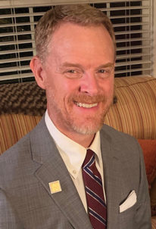 David Platts has been chosen as the next executive director of the South Carolina Arts Commission (SCAC), effective July 1. Platts currently serves as arts and science coordinator for Lancaster County (SC) School District, a position he has held for 15 years. In this position, Platts supports the Lancaster County School District’s arts teachers and oversees their instructional programs, six of which are for schools participating in the Arts in Basic Curriculum Project, a joint program of SCAC, Winthrop University and the South Carolina Department of Education. He manages the district’s arts state and federal education grants, some of which come from SCAC. Platts is formerly a teacher, assistant principal and principal at elementary schools elsewhere in South Carolina and holds bachelor’s and master’s degrees from the University of South Carolina. In addition to his work as an educator, Platts served locally on the Lancaster County Council of the Arts as a board member and president. He has statewide experience as a member, president and current treasurer of the Palmetto State Arts Education board and as a current member of the South Carolina Arts Alliance board, where he has been active as an arts advocate. He will succeed Ken May, who has helmed SCAC for nine years.
David Platts has been chosen as the next executive director of the South Carolina Arts Commission (SCAC), effective July 1. Platts currently serves as arts and science coordinator for Lancaster County (SC) School District, a position he has held for 15 years. In this position, Platts supports the Lancaster County School District’s arts teachers and oversees their instructional programs, six of which are for schools participating in the Arts in Basic Curriculum Project, a joint program of SCAC, Winthrop University and the South Carolina Department of Education. He manages the district’s arts state and federal education grants, some of which come from SCAC. Platts is formerly a teacher, assistant principal and principal at elementary schools elsewhere in South Carolina and holds bachelor’s and master’s degrees from the University of South Carolina. In addition to his work as an educator, Platts served locally on the Lancaster County Council of the Arts as a board member and president. He has statewide experience as a member, president and current treasurer of the Palmetto State Arts Education board and as a current member of the South Carolina Arts Alliance board, where he has been active as an arts advocate. He will succeed Ken May, who has helmed SCAC for nine years.
In this Issue
From the President and CEO
State to State
Legislative Update
Announcements and Resources
More Notes from NASAA
Research on Demand
SubscribeSubscribe
×
To receive information regarding updates to our newslettter. Please fill out the form below.
